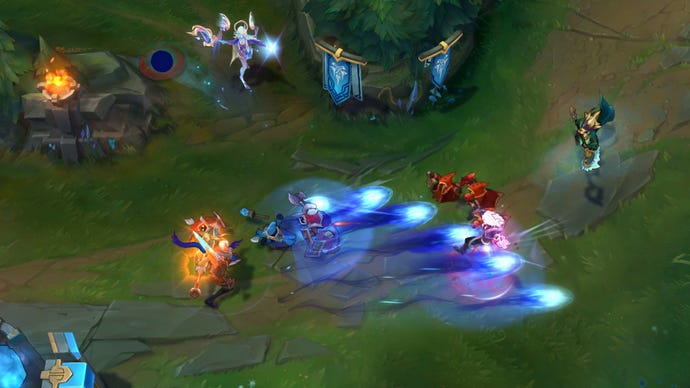HomeNewsLeague of Legends
League of Legends’ anti-cheat won’t brick your PC, Riot insist, after adding Valorant’s controversial system to the MOBAOffer reassurance that Vanguard doesn’t take screenshots of anything except the game itself
Offer reassurance that Vanguard doesn’t take screenshots of anything except the game itself
Image credit:Riot Games
Image credit:Riot Games

The already controversial decision to add the anti-cheat tool used in shooterValoranttoLeague of Legendshas seemingly caused developers Riot Games even more of a headache. The studio have issued a lengthy assurance that - at least as far as they know - the new anti-cheat software isn’t causing players’ hardware to end up bricked, despite various reports of major issues after its introduction.
To see this content please enable targeting cookies.Manage cookie settings
To see this content please enable targeting cookies.Manage cookie settings
Vanguard was added to League of Legends in patch 14.9, bringing the kernel-level anti-cheat system already used in Valorant for a number of years over to the MOBA. The idea was to crack down on bots, scripters and other cheating methods in the wake of Riot’s own data thatas many as one in 15 LoL gamessuffers cheating of some kind. That’s a good intention in concept, but one that has predictably divided opinions over the methods employed, with Vanguard accused of demanding a high CPU cost, effectively operating as spyware and taking screenshots of players' computer displays.
All of this led Riot’s team totake to the League of Legends subredditto defend the addition of the anti-cheat system and claim that any reported problems were in the vast minority of cases - and that worries of PCs ending up completely bricked were entirely unfounded.
According to the post, “the rollout has gone well and we’re already seeing Vanguard functioning as intended”, with a notable drop in the number of bot accounts in League. In comparison, Riot claimed that less than 0.03% of players had reported problems, with the “vast majority” of those that had run into issues experiencing “easily solved” errors.
“There are also a few trickier situations that have popped up that we’re actively looking into; driver incompatibilities for example,” the team acknowledged, encouraging those affected to contact player support.

Most importantly, the team denied that any reports of bricked hardware were accurate, stating in bold text: “We have not confirmed any instances of Vanguard bricking anyone’s hardware.”
After giving other examples of reported problems that weren’t down to Vanguard in the end - including the accidental enabling of SecureBoot, which unlike Valorant isn’t required for League of Legends - the team also looked to reassure those worried about Vanguard spying on their activity that “Vanguard DOES NOT take a screenshot of your whole computer/multiple monitors”.
“However, it will take a picture of your game client (in fullscreen) and the region your game client occupies (in windowed/borderless) for suspicious activity related to ESP hacks,” they clarified. “This is a very normal practice when it comes to anti-cheat and almost all anti-cheat do this. It is also a known element within the community of folks familiar with anti-cheat software.”
So it seems that Vanguard itself is largelyworking as it should- whatever your feelings on its introduction in general might be - and shouldn’t be able to see anything unwanted except perhaps my own terrible League of Legends stats. And even if you do run into trouble, please, please, don’t delete system32, for goodness’ sake.